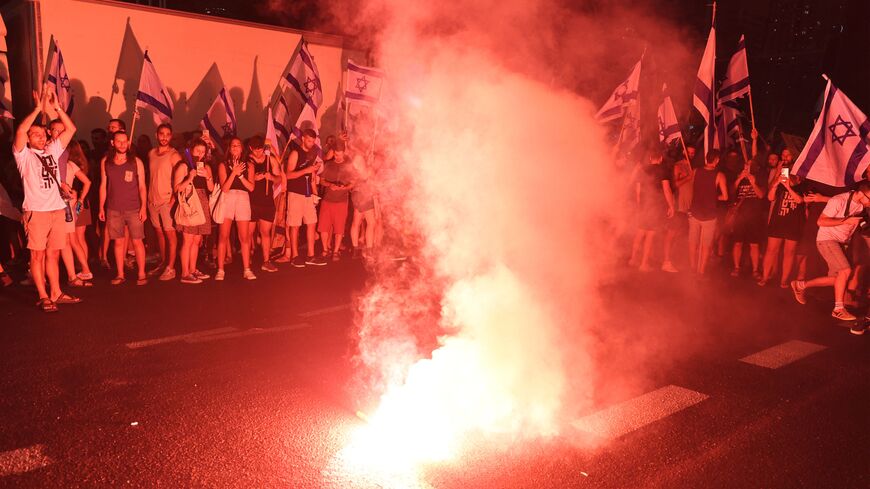TEL AVIV — The domestic upheaval gripping Israel, which peaked with Monday’s passage of a law — the "reasonableness clause" — curtailing the Supreme Court’s authority, is generating significant interest and rejoicing among Israel’s enemies.
Following the Knesset vote, Hezbollah Secretary-General Hassan Nasrallah described the passage of the bill as “the worst day” in Israeli history. "Israeli society — which thought that its army would not be defeated and that the state must stretch from the Nile to the Euphrates, and that Israel is a regional power — began to deteriorate in terms of its faith, its consciousness, its self-confidence and its confidence. … This is what puts it on the road to collapse, fragmentation and disappearance, God willing," the Iran-backed militia chief said in a televised speech.
Similar sentiments are voiced in Iran. "Netanyahu at the service of the Islamic Republic! The Islamic Republic cannot destroy Israel, but Netanyahu can, and that's exactly what he's doing right now,” wrote journalist Ahmed Zeid-Abadi in the Iranian newspaper Kayhan.
Damage on Air Force
Assessments in recent days by Israel’s top brass indicate that as of now, the protests have not undermined the state’s military capabilities and its preparedness to defend it, even against simultaneous attacks on multiple fronts. But unprecedented announcements by thousands of officers and soldiers of their intention to suspend their reserve service rather than serve a “dictatorship,” as they put it, are expected to take their toll on the military in the medium and long term.
The damage could be particularly severe for the Israel Air Force. "If dozens of fighter pilots stop training, they will lose their acuity within a few weeks and their fitness within a few months," a senior reserve pilot told Al-Monitor on condition of anonymity. “Imagine if the Los Angeles Lakers stopped practicing and their players didn't touch the ball for a month, and then faced a championship game against the Clippers. Their scoring would be significantly lower.” By the same token, he added, “the ability to land a powerful aerial strike on Iran, for example, is significantly impaired."
Following over six months of sustained public protests against the government’s plan to weaken the courts, the dramatic 64-0 Knesset vote sent tens of thousands of furious Israelis, most of them young, into the streets. They blocked major roads, lit bonfires and clashed with exhausted police, which responded in some cases with excessive use of force. Clashes also developed between pro-government and anti-government protesters adding to a growing sense of chaos at the loss of control by police and the government’s disregard of the protests.
Prime Minister Benjamin Netanyahu, too, appeared to have lost control of the extremists in his government who threatened to dismantle the governing coalition unless the legislation was approved.
His detachment was made clear on live television during the dramatic Knesset vote, when he was shown apparently disengaged from a furious argument raging over his head between Defense Minister Yoav Galant and Justice Minister Yariv Levin who were seated to his left and right. Galant, the most moderate voice in the hard-line government, was reportedly making a last-minute pitch for the legislation to be watered down while Levin insisted on charging ahead as he has since the day in January when he announced the judicial overhaul campaign.
In a further sign of concern, Netanyahu also refused to meet army Chief Lt. Gen. Herzi Halevi who sought to update him prior to the vote on the bill’s potential effect on the military. Netanyahu told Halevi the briefing could wait until after the vote, and the two did indeed meet later Monday evening. Nonetheless, Netanyahu, who had built a reputation for himself as a cautious, pragmatic and calculating statesman, seemed to have turned into a haunted, weak and irresponsible man.
Netanyahu was released from hospital just hours before the vote after undergoing an urgent procedure to fit him with a pacemaker. The news of his heart condition caught most Israelis by surprise and suggested the information had been deliberately concealed from the public for some time.
Weakened deterrence
Israel's enemies are now faced with a difficult decision: whether to take advantage of Israel’s seeming weakness and mount a military challenge against it, or keep waiting and watching with glee as Israel implodes. On Tuesday, hours after the night of riots and bonfires in Tel Aviv, Jerusalem, Haifa and other cities, armed Hezbollah operatives in uniform staged a showcase patrol along the border with Israel.
"Even if Hezbollah prefers to sit on the fence and let Israel disintegrate on its own," a senior Israeli security source told Al-Monitor on condition of anonymity, "we must not forget that Nasrallah's self-confidence has been restored.” The source added that the Israeli deterrence achieved by bombing Beirut’s Dahiya quarter housing Hezbollah headquarters in the 2006 war with Lebanon, had dissipated. “A minor incident on the border is enough for both sides to explode against each other," he warned.
Israel’s enemies are not the only ones closely monitoring the upheaval. President Joe Biden has urged Netanyahu in recent days to suspend the legislation, both in a call to the prime minister and in unusual comments to New York Times columnist Thomas Friedman. The day before the vote, Washington Post columnist Max Boot, a renowned historian, wrote an article headlined, “Israel’s biggest security threat is Benjamin Netanyahu,” warning that he was risking Israel’s special alliance with the United States.
Normally, these developments would have been a source of deep concern for Netanyahu and prompted a series of conciliatory moves vis-a-vis Washington. But the Netanyahu of 2023 is a feeble, detached politician, held hostage by extremists. Further aggravating ties with the Biden administration, Netanyahu's younger brother — Ido Netanyahu — cast aspersions about Biden’s “mental fitness” in a radio interview Tuesday. And Netanyahu is silent.








